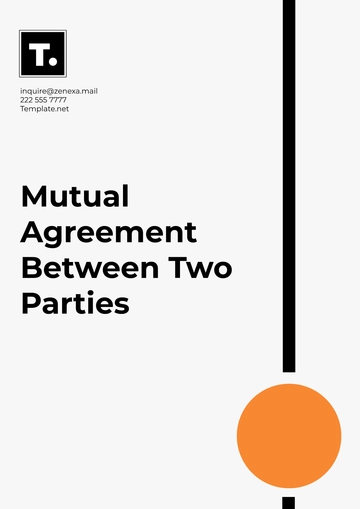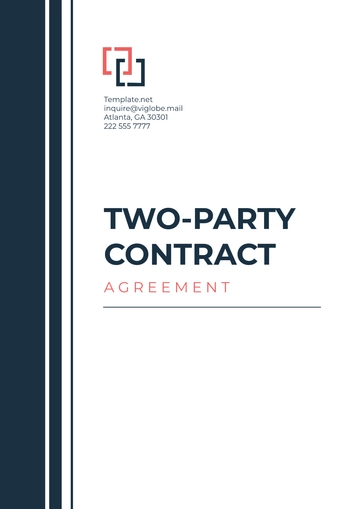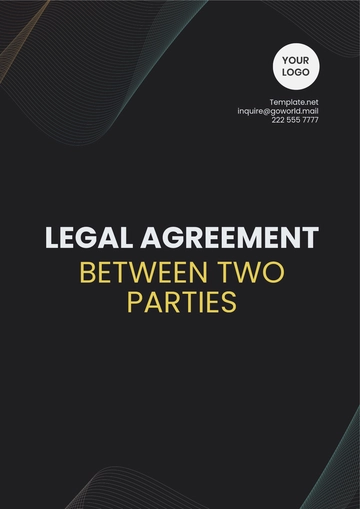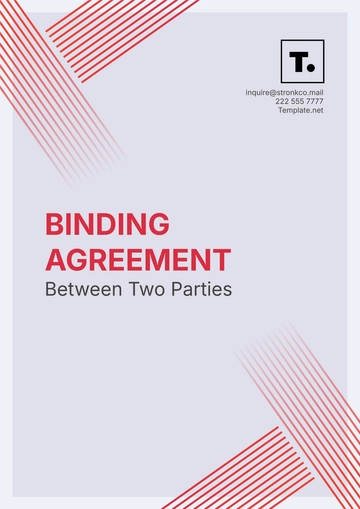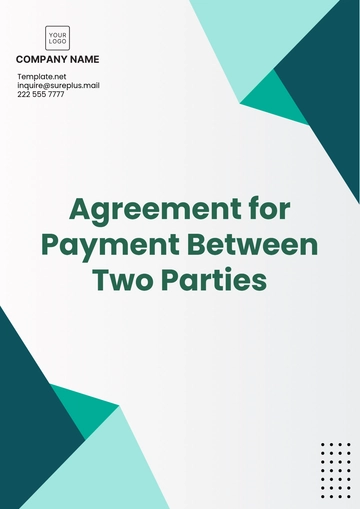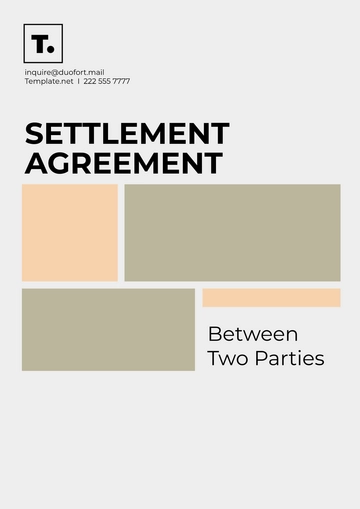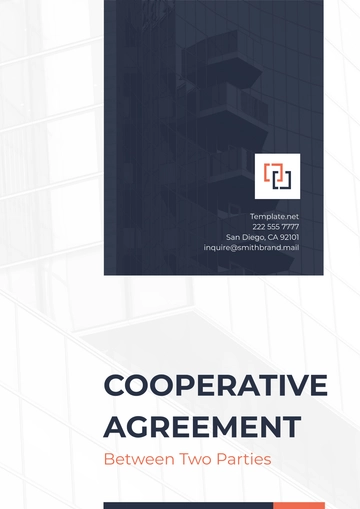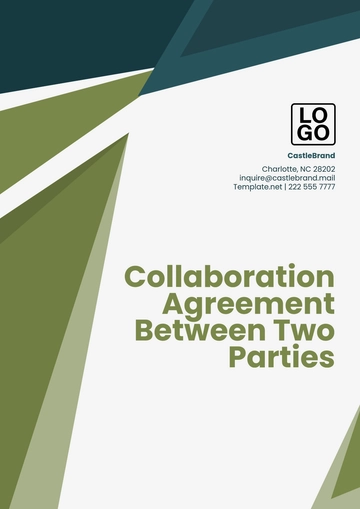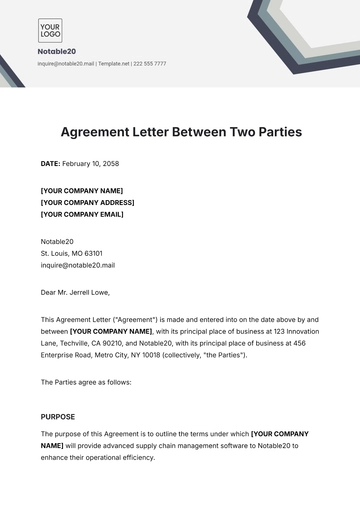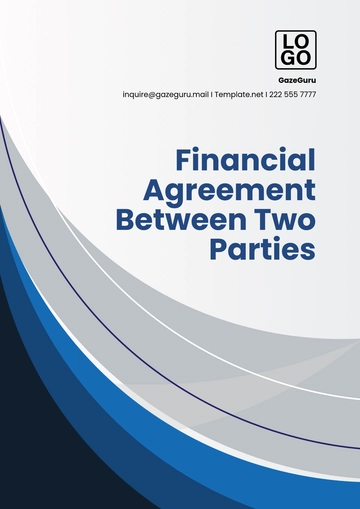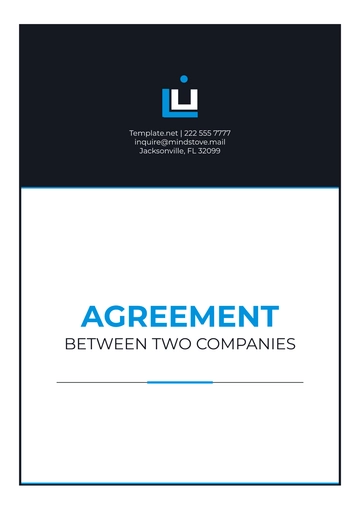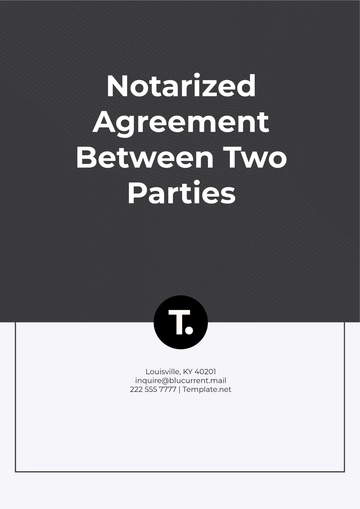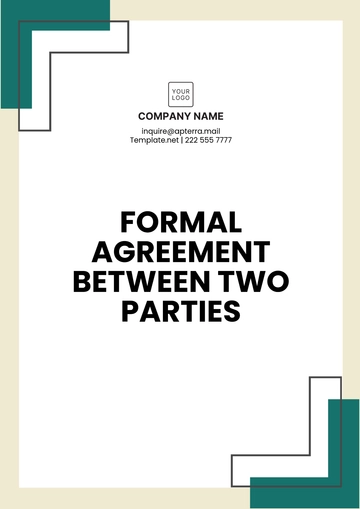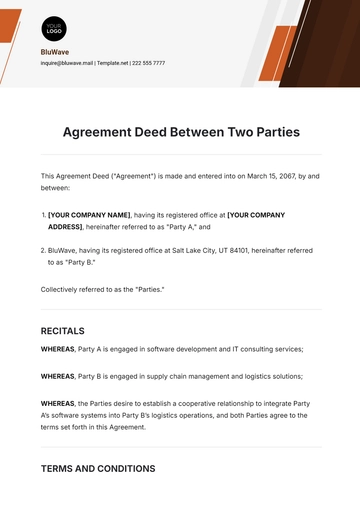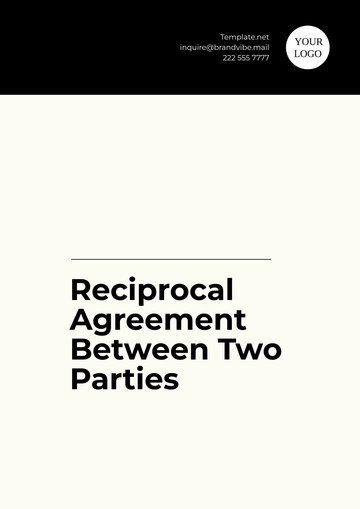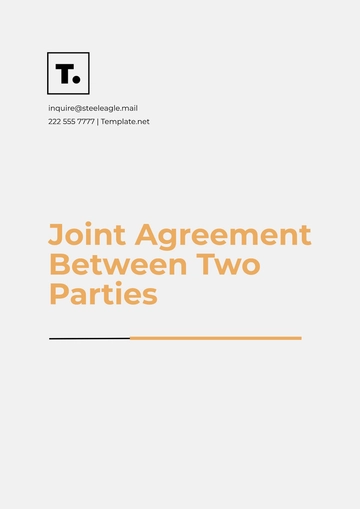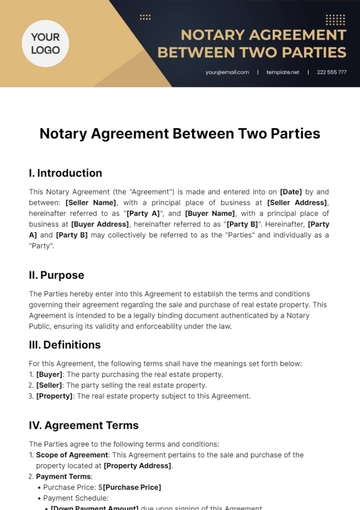Free Agreement Between Two Parties

This Agreement is entered into on this June 16, 2050 by and between [Your Company Name], located at [Your Company Address], known as Party A; and BlueLeaf, located at Miami, FL 33101, known as Party B.
1. PURPOSE OF AGREEMENT
This Agreement, a crucial keystone for Party A and Party B’s collaboration, clearly defines terms and conditions, fostering cooperation and mutual understanding. Both parties recognize the importance of their roles and commit to upholding their responsibilities, creating a seamless collaboration pathway. The Agreement ensures clarity in roles and enables each party to perform effectively, laying the foundation for a trustworthy partnership, necessary for achieving shared goals. United by a shared vision, both parties leverage their strengths to drive positive outcomes and are determined to overcome challenges and achieve success.
2. SCOPE OF AGREEMENT
This agreement outlines the duties and rights of Party A and Party B. Party A will provide specific services, as detailed later in the document. Party B, valuing these services, agrees to pay Party A a percentage of the revenue made from the results of Party A's work. By agreeing to this, both parties understand and accept their duties and responsibilities. These duties include Party A following the obligations set out in the agreement, and Party B honoring the agreement's terms of payment, which depend on the revenue made. Both parties should stick strictly to the terms of this agreement, with any changes needing mutual agreement and documentation. This agreement works towards a clear understanding, trust, cooperation, and shared goals. Any upcoming sections will elaborate on the rights, duties, and expectations to prevent misunderstandings.
3. COMPENSATION, PAYMENT, TERMS
Under this agreement, Party B is mandated to pay Party A a part of its revenue, the specific percentage of which is indicated within this agreement. Both parties are to achieve a mutual consensus on the payment terms, which are to be formally documented under this agreement. If any changes are to be made to these terms later on, they would necessitate amendments to this agreement, to which both parties must consent and agree.
3.1 Compensation Percentage Agreement: Party A will receive a predetermined percentage of revenue from Party B as compensation for services rendered, as outlined in this agreement.
a. The compensation percentage agreement delineates a clear proportion of revenue that Party A is entitled to receive from Party B. This ensures transparency and accountability in the distribution of earnings based on the services provided.
b. The agreement links Party A's compensation directly to the revenue generated, incentivizing optimal performance and fostering a mutually beneficial partnership between the parties involved.
c. Through this arrangement, Party A and Party B can adjust the compensation percentage to reflect changes in business dynamics or performance metrics, allowing for adaptability in their working relationship.
3.2 Payment Conditions: The terms of payment will be clearly defined within this agreement and subject to mutual agreement between Party A and Party B.
a. Both Party A and Party B will engage in negotiations to establish the payment conditions, ensuring that they align with the interests and capabilities of both parties.
b. The payment conditions outlined in this agreement will be transparent and articulated, leaving no room for ambiguity or misunderstanding between the involved parties.
c. The agreed-upon payment terms will possess a degree of flexibility to accommodate any unforeseen circumstances or changes in the business environment, fostering a collaborative and adaptable relationship between Party A and Party B.
3.3 Amendment Protocol: Any modifications to the payment terms must be agreed upon by both parties and documented through formal amendments to this agreement.
a. The protocol ensures the integrity of the agreement by requiring mutual agreement for any changes, fostering transparency and trust between the parties involved.
b. Through formal documentation, the protocol establishes a clear record of amendments, reducing the potential for misunderstandings or disputes regarding payment terms in the future.
c. By mandating mutual consent for modifications, the protocol promotes fair negotiation and protects the interests of both parties, maintaining a balanced contractual relationship.
4. COMPENSATION AND BENEFITS
Clarity and mutual agreement on compensation and benefits are crucial. Section 3 confirms Party A and Party B's acceptance of the compensation plan, building trust and understanding through transparency and fairness. This clear structure allows both parties to proceed confidently. They also note the relevance of additional benefits for supporting their work environment. Any such benefits will be discussed, agreed on, and documented in the agreement, showcasing their shared ideals. This process highlights the adaptable nature of their professional relationship, expressing a commitment to ongoing negotiation based on changing needs. Recognizing these extra benefits attests to their joint commitment to a positive, lasting work relationship.
5. CONFIDENTIALITY AND NON DISCLOSURE
Party A and Party B agree to keep all shared sensitive data confidential as per Clause 5.1 of the agreement. Disclosure to outsiders is barred without written consent as per Clause 5.2. This confidentiality applies even after the agreement ends, as per Clause 5.3.
5.1 Both parties agree to maintain strict confidentiality regarding any proprietary or sensitive information shared between them during their partnership.
5.2 Neither Party A nor Party B shall disclose any confidential information to third parties without prior written consent from the disclosing party.
5.3 This confidentiality obligation shall survive the termination of this Agreement.
6. TERMINATION CONDITION
6.1 Notice Period: Either party may terminate this Agreement upon providing written notice to the other party. However, the terminating party must give a notice period of 15 in advance, as agreed upon by both parties. This clause ensures that sufficient time is provided for both parties to prepare for the termination and make necessary arrangements.
6.2 Obligations upon Termination: Upon termination of the Agreement, both parties are obligated to fulfill any outstanding obligations as outlined in the Agreement. This includes completing any unfinished tasks, delivering pending goods or services, and settling any financial matters according to the terms specified within this Agreement.
6.3 Settlement of Financial Matters: In the event of termination, all financial matters shall be settled under the terms laid out in this Agreement. Both parties agree to promptly settle any outstanding payments or debts owed to each other, ensuring a fair and equitable resolution to any financial obligations.
6.4 Conclusion of Services: Upon termination, any ongoing services provided under the Agreement shall be concluded in an orderly manner. Both parties shall work together to ensure a smooth transition and minimize disruption to any affected parties or operations.
6.5 Return of Property: Upon termination, both parties shall promptly return any property or materials belonging to the other party. This includes but is not limited to equipment, documents, or any other assets provided or exchanged during the Agreement.
6.6 Survival of Certain Clauses: Notwithstanding termination, certain clauses of this Agreement shall survive, including but not limited to confidentiality, indemnification, and dispute resolution provisions. These clauses shall remain in full force and effect even after termination to ensure ongoing compliance and protection of both parties' interests.
7. DISPUTE RESOLUTION
7.1 Amicable Negotiation
Should a disagreement or dispute emerge as a result of this Agreement, all parties involved are devoted to finding a resolution through friendly and amicable discussions and communications. The emphasis in such negotiation efforts shall be on demonstrating good faith, collaboration, and cooperation as a viable option for dispute resolution.
7.2 Mediation Procedure
If the parties' negotiations are unable to reach a satisfactory resolution, it is mutually agreed upon by the parties, that they will participate in a mediation process. This mediation will be monitored and facilitated by an impartial party who has no vested interest in the outcome. This step will be undertaken before considering the initiation of any legal proceedings or actions.
7.3 Selection of Mediator
The parties involved in this matter are expected to work together to select a mediator. This mediator should not only be qualified with regards to the issue they need to help resolve but should also be mutually acceptable to both parties involved. This implies that the mediator should be neutral and should not favor any of the parties involved. In addition, the selected mediator must have expertise in the specific subject matter that needs to be addressed. Therefore, by following these requirements, both parties will ensure that the mediation process is fair and effective.
7.4 Mediation Process
During the process of mediation, both involved parties will actively participate in a form of dialogue that is open and constructive. The mediator will play a vital role by facilitating this conversation, ensuring that it impels forward in the correct and beneficial direction. The ultimate goal of this mediation process is to reach a settlement that is mutually beneficial and agreeable to both parties involved.
7.5 Legal Recourse
Should the mediation process fail to yield satisfactory results, the involved parties will still maintain their privilege to explore and utilize any legal solutions that are provided and permitted under the relevant law. However, the usage of these legal remedies is subject to the specified terms and conditions outlined in the present Agreement.
8. GOVERNING LAW
This Agreement will be regulated and interpreted per the legislation of the State of Florida, irrespective of any potential conflict with the principles of law that might arise in that particular jurisdiction. Furthermore, it should be noted explicitly that any legal proceedings or actions that may develop from disputing this Agreement must and will be conducted on an exclusive basis only in the court connected with the State of Florida.
IN WITNESS WHEREOF, the Parties hereto have executed this Agreement as of the date first above written.

[Your Name]
[Your Company Name]
June 16, 2050

Lyda Fadel
BlueLeaf
June 16, 2050
- 100% Customizable, free editor
- Access 1 Million+ Templates, photo’s & graphics
- Download or share as a template
- Click and replace photos, graphics, text, backgrounds
- Resize, crop, AI write & more
- Access advanced editor
Enhance and Discover the pinnacle of convenience with the Agreement between Two Parties Template from Template.net. Crafted for ease, this editable and customizable template empowers users to tailor agreements effortlessly. Seamlessly edit in our AI Editor Tool, ensuring precision and professionalism in every contract. Simplify negotiations with this versatile template today.
You may also like
- Lease Agreement
- Non Compete Agreement
- Rental Agreement
- Prenuptial Agreement
- Non Disclosure Agreement
- Operating Agreement
- Hold Harmless Agreement
- LLC Operating Agreement
- Arbitration Agreement
- Purchase Agreement
- Residential Lease Agreement
- Executive Agreement
- Confidentiality Agreement
- Contractor Agreement
- Partnership Agreement
- Postnuptial Agreement
- Collective Bargaining Agreement
- Loan Agreement
- Roommate Agreement
- Commercial Lease Agreement
- Separation Agreement
- Cohabitation Agreement
- Room Rental Agreement
- Child Custody Agreement
- Employee Agreement
- License Agreements
- Settlement Agreement
- Joint Venture Agreement
- Indemnity Agreement
- Subordination Agreement
- Sales Agreement
- Agreements Between Two Parties
- Business Agreement
- Real Estate Agreement
- HR Agreement
- Service Agreement
- Property Agreement
- Agreement Letter
- Restaurant Agreement
- Construction Agreement
- Finance Agreement
- Marketing Agreement
- Payment Agreement
- Investment Agreement
- Management Agreement
- Nonprofit Agreement
- Software Agreement
- Startup Agreement
- Agency Agreement
- Copyright Agreement
- Collaboration Agreement
- Reseller Agreement
- Car Rental Agreement
- Cleaning Services Agreement
- Consultant Agreement
- Deed Agreement
- Car Agreement
- Equipment Agreement
- Shares Agreement
- Data Sharing Agreement
- Advertising Agreement
- School Agreement
- Franchise Agreement
- Event Agreement
- Travel Agency Agreement
- Vehicle Agreement
- Board Resolution Agreement
- Land Agreement
- Binding Agreement
- Tenancy Agreement
- Exclusive Agreement
- Development Agreement
- Assignment Agreement
- Design Agreement
- Equity Agreement
- Mortgage Agreement
- Purchase and Sale Agreement
- Shareholder Agreement
- Vendor Agreement
- Royalty Agreement
- Vehicle Lease Agreement
- Hotel Agreement
- Tenant Agreement
- Artist Agreement
- Commission Agreement
- Consignment Agreement
- Debt Agreement
- Recruitment Agreement
- Training Agreement
- Transfer Agreement
- Apprenticeship Agreement
- IT and Software Agreement
- Referral Agreement
- Resolution Agreement
- Waiver Agreement
- Consent Agreement
- Partner Agreement
- Social Media Agreement
- Customer Agreement
- Credit Agreement
- Supply Agreement
- Agent Agreement
- Brand Agreement
- Law Firm Agreement
- Maintenance Agreement
- Mutual Agreement
- Retail Agreement
- Deposit Agreement
- Land Purchase Agreement
- Nursing Home Agreement
- Supplier Agreement
- Buy Sell Agreement
- Child Support Agreement
- Landlord Agreement
- Payment Plan Agreement
- Release Agreement
- Research Agreement
- Sponsorship Agreement
- Buyout Agreement
- Equipment Rental Agreement
- Farm Agreement
- Manufacturing Agreement
- Strategic Agreement
- Termination of Lease Agreement
- Compliance Agreement
- Family Agreement
- Interior Design Agreement
- Ownership Agreement
- Residential Lease Agreement
- Retainer Agreement
- Trade Agreement
- University Agreement
- Broker Agreement
- Dissolution Agreement
- Funding Agreement
- Hosting Agreement
- Investor Agreement
- Memorandum of Agreement
- Advisory Agreement
- Affiliate Agreement
- Freelancer Agreement
- Grant Agreement
- Master Service Agreement
- Parking Agreement
- Subscription Agreement
- Trust Agreement
- Cancellation Agreement
- Horse Agreement
- Influencer Agreement
- Membership Agreement
- Vacation Rental Agreement
- Wholesale Agreement
- Author Agreement
- Distributor Agreement
- Exchange Agreement
- Food Agreement
- Guarantee Agreement
- Installment Agreement
- Internship Agreement
- Music Agreement
- Severance Agreement
- Software Development Agreement
- Storage Agreement
- Facility Agreement
- Intercompany Agreement
- Lending Agreement
- Lodger Agreement
- Outsourcing Services Agreement
- Usage Agreement
- Assurance Agreement
- Photography Agreement
- Profit Sharing Agreement
- Relationship Agreement
- Rent To Own Agreement
- Repayment Agreement
- Volunteer Agreement
- Co Parenting Agreement
- HVAC Agreement
- Lawn Care Agreement
- SAAS Agreement
- Work from Home Agreement
- Coaching Agreement
- Protection Agreement
- Security Agreement
- Repair Agreement
- Agreements License


